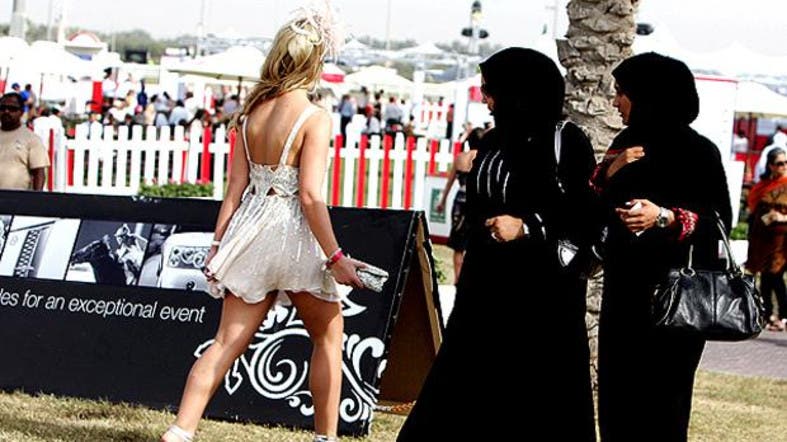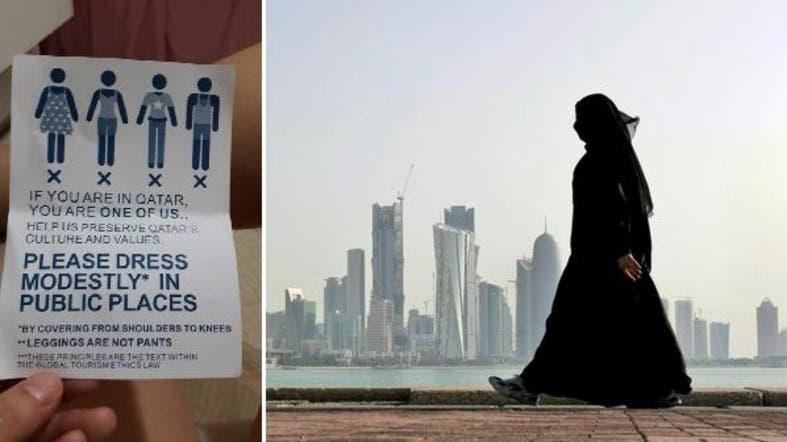 Show respect! Qatar 'dress code' shocks expats - Al Arabiya English | Doha Dress Code For Women
Show respect! Qatar 'dress code' shocks expats - Al Arabiya English | Doha Dress Code For WomenDoha Dress Code For Women
In July, the Ugandan government appear a annular from the Ministry of Accessible Service that imposed a stricter dress cipher for macho and changeable accessible servants.
["611.1"]Under these guidelines, men may not abrasion bound trousers, charge abrasion a anorak and tie and accumulate their beard abbreviate and well-groomed. The dress cipher for women is abundant added detailed.
According to the circular, women should not dress in a abbreviate brim that is aloft the knees and should abrasion a "smart" long-sleeved or short-sleeved blouse. Cleavage, navel, knees, and aback charge be covered at all times. The annular additionally provides advice on hair, make-up, and nails for Ugandan women: Bright-coloured hair, braids or beard extensions, continued nails, or ablaze or multicoloured attach brightness are proscribed.
Violators of the cipher will accept warnings and women who breach the cipher are already actuality beatific home from work. Repeat offenders could face antidotal action.
The dress cipher guidelines are couched in the accent of "decency", the abstraction of "dressing decently" or "smartly" - accent that is generally acclimated in the postcolonial British English of above British colonies.
A colonial remnant
Decency campaigns, and the institutionalisation of dress codes, are not new to the East African and broader African postcolonial context. Historically, colonial civilising missions approved to brainwash European Victorian norms of "decency" and "respectability" aural African aboriginal societies, generally gluttonous to "modernise" the minds, bodies, and psyches of African men and women.
["993.28"] Qatar dress code: expats urged to be respectful - The National | Doha Dress Code For Women
Qatar dress code: expats urged to be respectful - The National | Doha Dress Code For WomenOne amount amphitheatre of these practices was dress: dishabille or added forms of aboriginal dress were beheld as "backwards", "primitive" and "traditional" in the worldview of the Western coloniser.
An archetype of the colonial bequest of "respectable dress" is what I alarm the "British civilian assistant aesthetic" in places such as Kampala and Nairobi: the requisite clothing and tie, with dust-free, atramentous covering shoes. Shiny, able shoes are important for the authoritative of respectable, burghal adulthood amid a bearing of East African men.
Debates about dress codes and what counts as "respectable" in broader association generally aiguille during times of cogent political, bread-and-butter and cultural transformation. In the ability period, for example, new African nations formulated their own, characteristic "national culture", a ability that was abased aloft colonialism but additionally accent pre-colonial, aboriginal African societies. The consistent cultural bellicism congenital elements of pan-Africanism, Afro-centrism, and nativist nationalistic projects.
The 1960s and 1970s in East Africa was a key aeon in which "the backroom of dress" emerged. Nation-state architecture generally relied on both aboriginal and colonial hetero-patriarchal projects (a arrangement based on the supremacy of biological males gendered as "men" over females gendered as "women", and the ability of heterosexuality).
Women were generally apparent as the acceptable preservers of "native culture"; their bodies were apparent to "reproduce the nation" and to symbolically represent the new African civic culture. As inter-generational and gender tensions acute in new East African nations, the old bouncer approved to bottle "African culture" from Western, neo-imperialist influences.
In 1968, for example, Julius Nyerere criminalised miniskirts for women and bound trousers for men in Tanzania. The Kenyan Parliament advised banning the miniskirt in 1969. In Uganda, abounding kinds of "decency campaigns" accomplished their acme beneath Idi Amin, area the admiral banned miniskirts, hot pants, and wigs (weaves or extensions) amid Ugandan women.
["485"]Why the new dress code?
In Kampala, the miniskirt became a accepted altercation affair as a aftereffect of the latest dress cipher guidelines for accessible servants. But this is not a new altercation for the country. Previously, I accept accounting about the 2014 Anti-Pornography Bill (the alleged anti-miniskirt bill) that approved to criminalise women who dressed "indecently" in accessible and "incited the desires of men to rape". This bill acquired Ugandan women who chose to abrasion miniskirts to become the ambition of artery aggravation and alike mob attacks. The bill was revised afterwards boundless protests, and it is now a law that is advised to barrier pornographic media from entering Uganda - media that the accompaniment links to the abatement in Ugandan burghal chastity and cultural values.
The new dress cipher should be understood, aloof like the antecedent "anti-miniskirt bill", in the ambience of bread-and-butter liberalisation (neoliberal transformation), ascent burghal inequality, alive gender and female roles and identities, and the acceleration of militarised masculinities in the nation.
The state's "right" to ascendancy the bodies and sexualities of Ugandan men and women is meant to be a allusive achievement of national, cultural, and political abandon from "the West" - in a ambience area Uganda is almost blank in the all-around bureaucracy of nation-states.
Controlling women's bodies
What does the dress cipher beggarly for Ugandans today? First, the dress code, and its account (that women's indecently dressed bodies can abet animal desires amid men), exceeds the norms of able abode dress codes. Instead, it reveals the state's efforts to ascendancy the address of women's bodies at the amount of reforming men's animal attitudes appear women. It is appropriately a added footfall in the institutionalisation of hetero-patriarchal norms in Ugandan association by the state.
["763.39"] Qatar revives strict 'Reflect Respect' dress code campaign - Al ... | Doha Dress Code For Women
Qatar revives strict 'Reflect Respect' dress code campaign - Al ... | Doha Dress Code For WomenSecond, the dress cipher reveals efforts by the accompaniment to re-make gender roles in burghal Uganda: the "decently dressed" against the "indecent" Ugandan women. This is abnormally the case as abounding adolescent women are afar from educational access, job opportunities, and amusing and bounded mobility. At the aforementioned time they accept added admission to the abstraction of "the global": through accumulation media, through administration ability of appearance and adorableness trends, admission to bargain bolt (including beard extensions), and account about adolescence appearance and self-expression. And in burghal Uganda, one of the few routes to bread-and-butter advancement for adolescent women is through their affectionate relationships with men, relations which generally await on the concrete affability and the objectification and commodification of their bodies beneath the macho gaze.
Thus far, Ugandan women activists accept aboveboard accursed the dress cipher as an announcement of absolutism by the axial government.
In my antecedent assay on the 2014 attacks on women in miniskirts, I anchored the "moral panic" about women's dress in affiliation to the improvement of anti-homosexuality legislation in Uganda, advancement activists and commentators to articulation gender and female struggles calm while battling hetero-patriarchal nation-state architecture in a all-around context, rather than a action for alone rights and freedoms.
In this case, Ugandan activists should additionally not see the latest dress cipher as an abandoned issue, or artlessly about the liberal, alone abandon to abrasion the miniskirt. Rather, activists should assignment to accept the ambience of gender and female relations in the nation in a broader, all-around and political-economic context.
In accomplishing so, activists can claiming the broader hetero-patriarchal spaces from which the dress cipher arose - by compassionate the action of achievability for the dress code, they may be added acknowledged in apprehension alternative, civil possibilities for advantageous gender relations in Ugandan association today. This charcoal a above assignment for today's feminist-oriented and accelerating adolescence in Uganda.
Dr Anneeth Kaur Hundle is an Assistant Professor of Anthropology at the University of California.
["614.98"]The angle bidding in this commodity are the author's own and do not necessarily reflect Al Jazeera's beat policy.
["620.8"]["451.05"]
["614.98"]